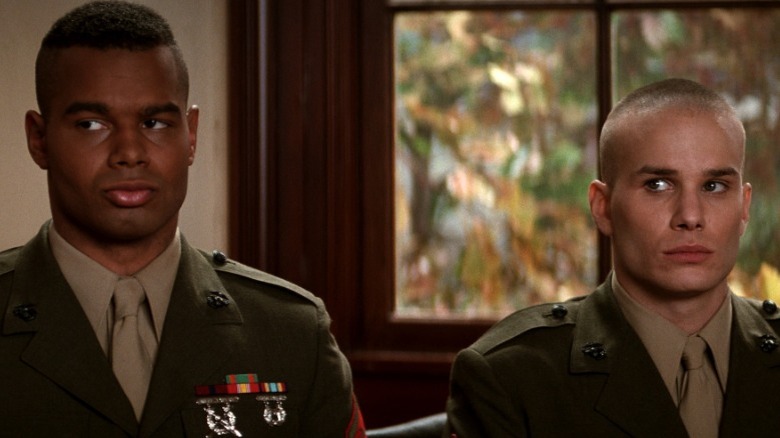What A Code Red Really Means In A Few Good Men
"A Few Good Men" was a turning point in the careers of two men. For director Rob Reiner, it marked the twilight of his acclaimed early period, bookending an incredible run of '80s and '90s classics that began with "This Is Spinal Tap" and preceding an era of critical and commercial flops such as "North" and "The Story of Us." For screenwriter Aaron Sorkin, meanwhile, "A Few Good Men," adapted from his eponymous play, was exactly the opposite: the moment the rising New York playwright broke through in Hollywood, leading to a meteoric rise through the ranks of film and TV writing.
As Sorkin's calling-card project, "A Few Good Men" contains many of his authorial trademarks, which would later become known — sometimes affectionately, sometimes derisively — as "Sorkinisms." Overall, the Tom Cruise and Jack Nicholson-starring military courtroom drama heralded Sorkin's unique way of bringing theater sensibilities to the cinema in a way that made sense — by emphasizing dialogue, interplay, action, and reaction, and characters responding to events rather than the events themselves. Against the grain of common screenwriting wisdom, Sorkin largely made his name by telling rather than showing, and nowhere in his career is that on better display than in "A Few Good Men," which unfolds via sustained conversations and investigations about a past we never get to see with our own eyes. While that strategy gives the drama an unusual, riveting immediacy, it can also make some details confusing, such as the exact nature of the legal concept upon which "A Few Good Men" is predicated.
Code red refers to any form of off-the-book punishment carried out in military bases
Spoilers for "A Few Good Men" follow.
One of the most dependable "Sorkinisms" rears its head repeatedly throughout "A Few Good Men" — namely, the belief in the fundamental soundness of American institutions, the failures of which can be attributed to the bad people occupying them. In this case, that belief is manifested via the downfall of Col. Nathan R. Jessup (Nicholson), the commander of the Guantanamo Bay Naval Base where the movie takes place.
Though Marine law requires all forms of punishment to be strictly legal and in accordance with due process, Jessup believes that there's nothing wrong with giving the occasional "code red" order, i.e., determining that off-the-book punishment be inflicted on soldiers so as to improve their performance. He believes that the "due process" was put in place by people who don't understand the toll of military training and that sometimes it's necessary to take shortcuts. In the movie, those shortcuts take the form of violent hazing rituals, which are depicted as being commonplace under Jessup's rule.
The death of William Santiago (Michael DeLorenzo) by one such ritual and Jessup's subsequent attempt to cover his tracks were inspired by a famous real-life case taken up by Sorkin's sister Deborah during a JAG stint. "We keep a base in Guantanamo Bay. A bunch of marines down there hazed a guy in their squad and it went bad. Something went wrong and this kid almost died. The accused are saying they were ordered to do it by a superior. Something called a Code Red," Sorkin said, quoting his sister, in an interview with ThisIsTheatre.com about the play's origins.

